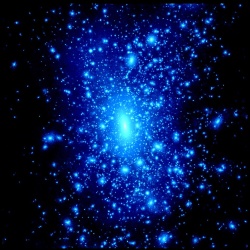Water found in another Galaxy

Astronomers have found evidence of the most distant water ever located in the universe, the water has been found in a another galaxy billions of light years away.
This astounding discovery was made by a joint USA - European venture and has been announced at the "European Week of Astronomy and Space Science" conference.
The water vapour is thought to be a jet stream ejected from a super-massive black hole at the centre of the distant galaxy (about 19.8 billion light years distant). The water has been observed as a "maser" which means that molecules of gas amplify and in doing so emit beams of microwave radiation.
Due to the distance and the laws of physics, the further away something is seen, the longer ago the event happened. The waters signature was seen at radio wavelengths and is only now being detected.
It has been estimated that the water that has been detected was actually emitted when the universe was only 2.5 billion years old (a fifth of its estimated current age).
John McKean of the Netherlands Institute for Radio Astronomy said:
"We have been observing the water maser every month since the detection and seen a steady signal with no apparent change in the velocity of the water vapour in the data we've obtained so far"
"This backs up our prediction that the water is found in the jet from the supermassive black hole, rather than the rotating disc of gas that surrounds it."
It is thought by some of the researchers that there were many more galaxies like this in the early universe, however surveys of nearer (and younger) galaxies has shown that only 5% have powerful water masers associated with active nuclei. Further studies have also shown that very powerful water masers are very rare when you compare them with their less luminous counterparts.
The pan-continental research group is led by Dr Violette Impellizzeri, from the Max Planck Institute for Radio Astronomy in Germany and began by using the 100m German Effelsberg radio telescope from July to September 2007.
The data was later confirmed by observations with the Expanded Very Large Array in the USA in September and October 2007.
News Archives
- August 2024
- July 2023
- April 2023
- February 2023
- September 2022
- March 2022
- February 2022
- July 2021
- June 2021
- April 2021
- March 2021
- January 2021
- October 2020
- September 2020
- June 2020
- March 2020
- May 2019
- January 2019
- November 2018
- January 2016
- September 2015
- August 2015
- July 2015
- June 2015
- May 2015
- April 2015
- March 2015
- January 2015
- October 2014
- June 2014
- April 2014
- March 2014
- February 2014
- January 2014
- December 2013
- November 2013
- October 2013
- September 2013
- June 2013
- May 2013
- April 2013
- March 2013
- January 2013
- December 2012
- November 2012
- August 2012
- July 2012
- June 2012
- May 2012
- April 2012
- March 2012
- February 2012
- January 2012
- December 2011
- November 2011
- October 2011
- September 2011
- August 2011
- July 2011
- June 2011
- May 2011
- April 2011
- March 2011
- February 2011
- January 2011
- December 2010
- November 2010
- October 2010
- September 2010
- August 2010
- July 2010
- June 2010
- May 2010
- April 2010
- March 2010
- February 2010
- January 2010
- December 2009
- November 2009
- October 2009
- September 2009
- August 2009
- July 2009
- June 2009
- May 2009
- April 2009
- March 2009
- February 2009
- January 2009
- December 2008
- November 2008
- October 2008
- September 2008
